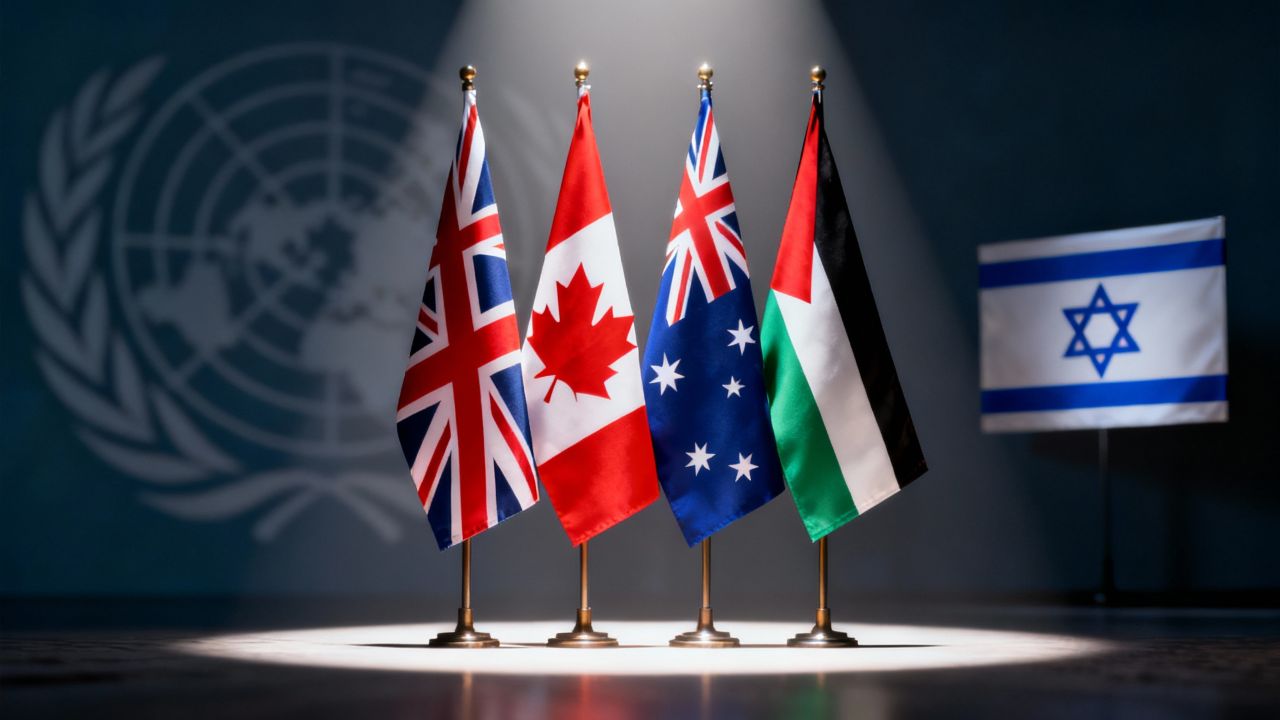
The headlines that once felt unimaginable are now blunt fact: three of Israel’s staunchest allies—the United Kingdom, Canada and Australia—have formally recognized a Palestinian state. What was once dismissed as fringe European diplomacy has now crossed the Atlantic and the Pacific.
The center has shifted, and Israel now finds itself more isolated than at any time in its modern history.
A Coordinated Break with Washington
The move was coordinated and deliberate. British Prime Minister Keir Starmer declared that recognition was necessary “to keep alive the possibility of peace” and a two-state solution, at a moment when both seem all but extinguished. Canadian Prime Minister Mark Carney framed it as giving Palestinians hope while insisting Hamas must play no role in governance. In New York, Australian leader Anthony Albanese said the recognition was timed to the UN General Assembly, designed to blunt Israel’s Gaza offensive with a global show of will.
The coordination matters. None of these leaders wanted to stand alone against the fury in Jerusalem—and in Washington. Collectively, they are making the recognition of Palestine less of a symbolic gesture and more a restructuring of Western foreign policy.
Netanyahu’s Furious Rejection
Israeli Prime Minister Benjamin Netanyahu’s response was predictable but revealing. He denounced the recognition as an “enormous prize for terror” and insisted “there will be no Palestinian state west of the Jordan River”. His far-right allies escalated the rhetoric further: Knesset Speaker Amir Ohana called Starmer a “modern appeaser,” while National Security Minister Itamar Ben Gvir argued Israel must annex the West Bank immediately.
This, too, was coordinated—but in the opposite direction. Rather than offer even a symbolic nod toward peace, Israel doubled down on maximalism. That doubling down is what has pushed allies like London, Ottawa and Canberra over the edge: recognition is not about rewarding Hamas; it’s about signaling to Netanyahu that his government’s policies have closed off nearly every avenue for a viable two-state solution.
What Recognition Actually Means
Let’s be clear: recognition does not conjure a Palestinian state into being. Palestine still lacks agreed borders, control of territory, or a functioning capital in East Jerusalem. Gaza remains pulverized, its population displaced and starving, with more than 65,000 killed since October 2023, according to Palestinian health officials.
Recognition is symbolic, yes—but symbolism matters in international law. It strengthens Palestinian efforts in treaty-making, bolsters their legal standing at the UN, and creates a diplomatic wedge within the Western alliance. Recognition helps frame Palestine not as an aspiration but as a foregone conclusion.
Washington’s Problem—and Trump’s Shadow
The immediate fallout is already rattling the transatlantic relationship. The Biden administration had resisted recognition, arguing it would embolden Hamas. But Washington is no longer in control: the UK is not simply “going wobbly”—it’s defecting on the central Middle East policy that has bound it to the U.S. for decades.
Donald Trump, now back in the Oval Office, has threatened “punitive measures” against Canada and Australia, according to reporting from Sydney and Ottawa. That threat reveals just how much of this story is about internal Western fractures. What does it mean when NATO allies are willing to side with the UN General Assembly over Washington?
The Bigger Picture: Democracy, Accountability and Power
Zoom out, and the implications are staggering. For decades, Israel relied on an implicit Western compact: security guarantees and diplomatic protection in exchange for maintaining at least the fiction of a two-state horizon. Netanyahu shredded that compact—expanding settlements, escalating military campaigns, and treating the very idea of Palestinian sovereignty as delusional.
Now the fiction has collapsed. The recognition wave—Portugal, France, Belgium and New Zealand are poised to follow—signals that Israel is slipping into the category of a pariah state, not unlike apartheid South Africa. For progressives who have argued that unconditional Western backing was unsustainable, this is vindication. For Israelis who believed their leaders could bank endless international indulgence, this is the loudest wake-up call in decades.
What Comes Next
Recognition won’t feed starving children in Gaza tonight. It won’t bring home Israeli hostages. But it makes clear that an increasing slice of the democratic world no longer accepts Netanyahu’s framing of the conflict. The question is not whether recognition is symbolic—the question is whether an accumulation of symbols can eventually force negotiations, sanctions, and real change on the ground.
For now: Israel is furious, Washington is divided, and Palestinians are, at least diplomatically, being seen for the first time as a state in waiting.
This week’s UN meeting will show if this was a one-off shock—or the beginning of a fundamental redrawing of Western policy in the Middle East.
